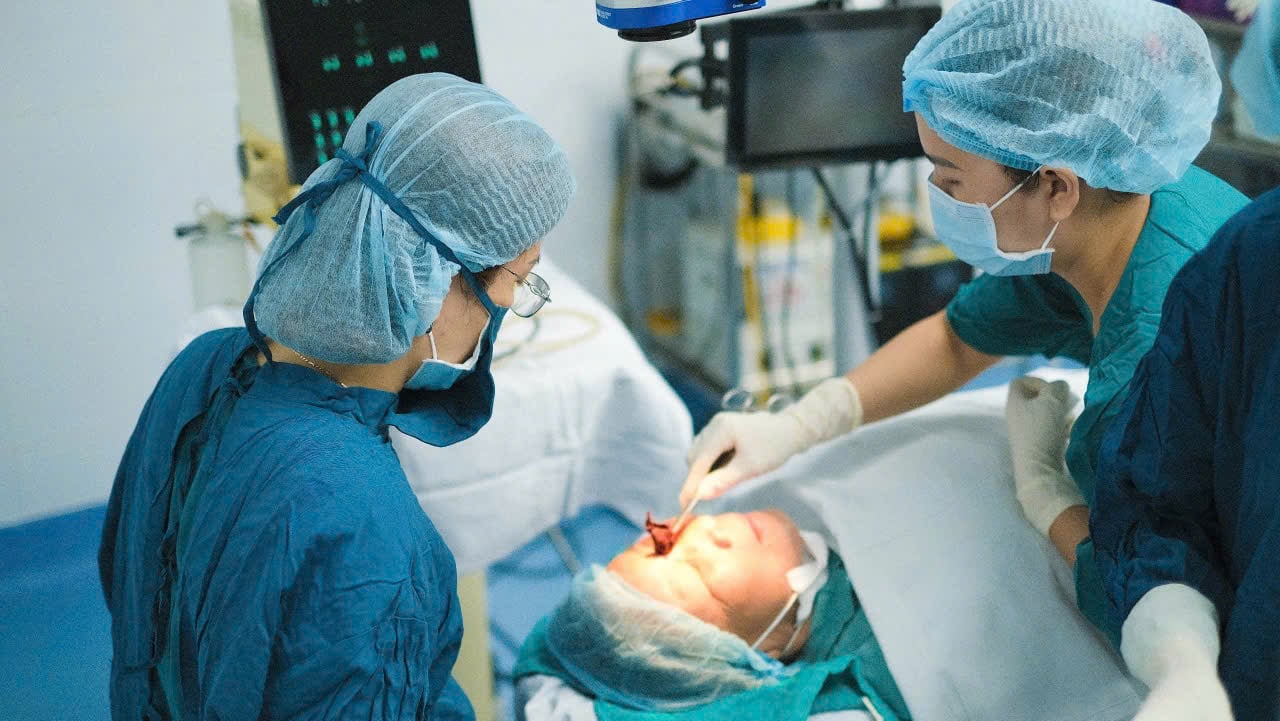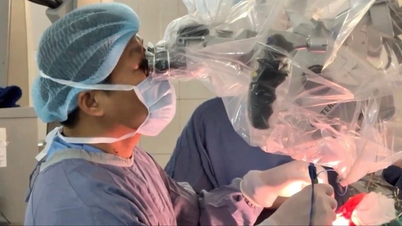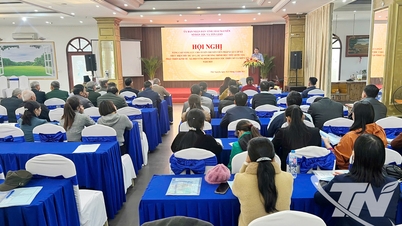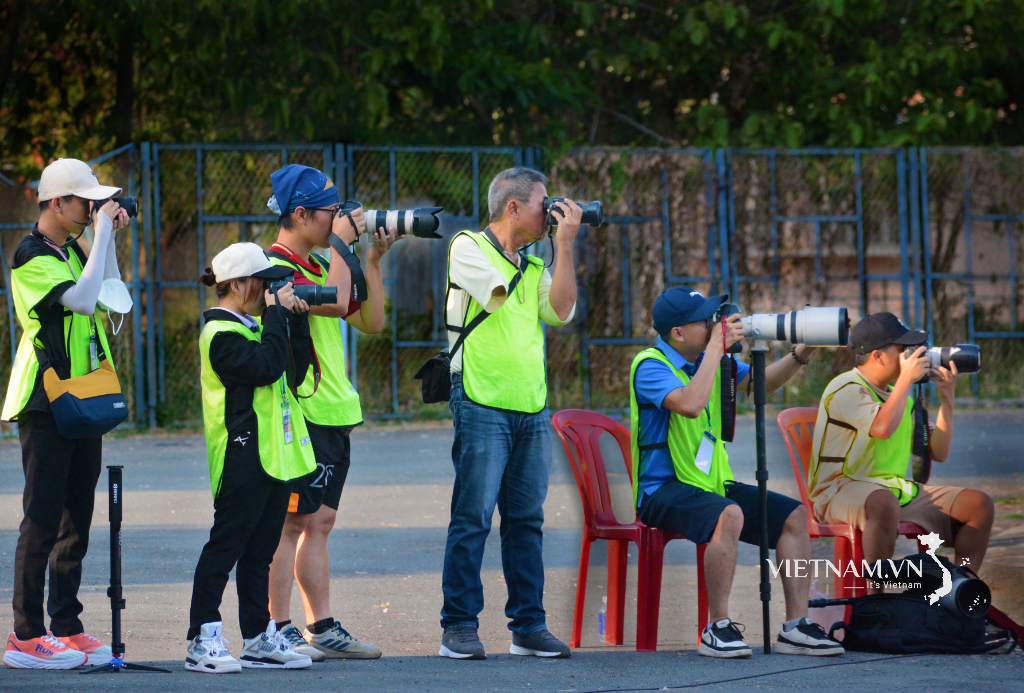Vitrectomy surgery at Quang Tri Eye Hospital - Photo: HN
The first posterior segment vitrectomy (also known as vitrectomy) surgery at the Eye Hospital for patient Nguyen Huu H. (69 years old) took place on May 21, 2025. The surgical team, including the Director of the Eye Hospital, Bui Thi Van Anh, and doctors Hoang My Duyen and Hoang Giang, along with the patient's family, were delighted by the successful surgery. The patient had been admitted the day before, where doctors diagnosed the right eye with a displaced artificial lens into the vitreous humor, and recommended vitrectomy and artificial lens fixation surgery.
Previously, all patients in Quang Tri who needed posterior segment surgery had to be transferred to higher-level hospitals. Every year, Quang Tri Eye Hospital alone transferred 70-100 cases, all of which were severe. Therefore, the first-ever implementation of this surgical service is a source of joy for the doctors and nurses at the hospital, as well as the patients' families.
This technique requires ophthalmologists with in-depth and systematic training in vitreoretinal surgery, along with a modern system of equipment for diagnosis and surgery, as well as professional coordination from the operating room team. "The Eye Hospital has prepared all the necessary conditions to launch the posterior segment surgery service to provide the best possible convenience for patients," said Dr. Hoang Giang, one of the surgeons who performed the operation.
What is vitrectomy surgery? Vitrectomy is a surgical procedure to remove cloudy vitreous humor, helping to treat certain vitreoretinal diseases. Vitrectomy surgery involves surgical procedures within the vitreous cavity, removing the diseased vitreous humor and replacing it with saline solution. This prevents vision loss or vitreoretinal damage that can lead to risks such as hemorrhage or retinal detachment. |
Posterior segment surgery is a modern and specialized ophthalmic technique in the field of the fundus, focusing on the diagnosis and treatment of pathologies located in the posterior part of the eyeball, including: the retina, macula, choroid, and optic nerve.
These are crucial structures that play an essential role in receiving and transmitting light signals from the eye to the brain. When these structures are damaged, if not treated promptly, vision can be severely impaired or lead to blindness.
Vitreoretinal surgery is usually indicated in the following cases: retinal detachment; vitreous hemorrhage (commonly seen in diabetic patients); macular hole; epiretinal membrane; penetrating eye wounds affecting the posterior pole; endophthalmitis and proliferative diabetic retinopathy. This surgery is contraindicated for individuals with ocular atrophy, loss of visual function, and neovascular glaucoma.
Posterior segment pathologies have always been among the most complex groups of eye diseases in ophthalmology. In recent years, their incidence has increased significantly. The current disease pattern in ophthalmology has changed compared to the past, with the emergence of non-communicable eye diseases that can cause blindness, typically diabetic retinopathy – a non-communicable systemic disease that is becoming increasingly prevalent alongside societal development.
According to Dr. Bui Thi Van Anh, Director of Quang Tri Eye Hospital, vitreoretinal surgery is a significant step forward in treating serious posterior segment diseases. Equipped with an OCT retinal tomography machine and a modern posterior segment surgery system, the Eye Hospital has mastered the techniques for diagnosing and treating posterior segment eye diseases. “The implementation of this service benefits patients from the healthcare system of Quang Tri province in general and from specialized ophthalmology facilities in Quang Tri in particular,” Dr. Van Anh stated.
According to recommendations from doctors at Quang Tri Eye Hospital, patients should note the following before vitrectomy surgery: In cases of retinal disease, if surgery is not urgent, patients should limit strenuous activity, avoid air travel, and allow sufficient rest time.
Patients should eat a normal breakfast on the day of surgery, except if blood tests are being performed for the surgery, in which case they should fast beforehand. Limit alcohol and stimulants before surgery; avoid eye makeup on the day of surgery.
Avoid wearing pullovers or fur-lined clothing. Get enough sleep and prepare yourself mentally and emotionally before surgery. Patients should return to the hospital for a follow-up examination and eye check-up 1-3 days after vitrectomy surgery. This may be sooner if any abnormalities are detected after the surgery.
Hoai Nam
Source: https://baoquangtri.vn/trien-khai-dich-vu-phau-thuat-ban-phan-sau-tai-benh-vien-mat-193844.htm




































![[Video] The craft of making Dong Ho folk paintings has been inscribed by UNESCO on the List of Crafts in Need of Urgent Safeguarding.](https://vphoto.vietnam.vn/thumb/402x226/vietnam/resource/IMAGE/2025/12/10/1765350246533_tranh-dong-ho-734-jpg.webp)







































































Comment (0)